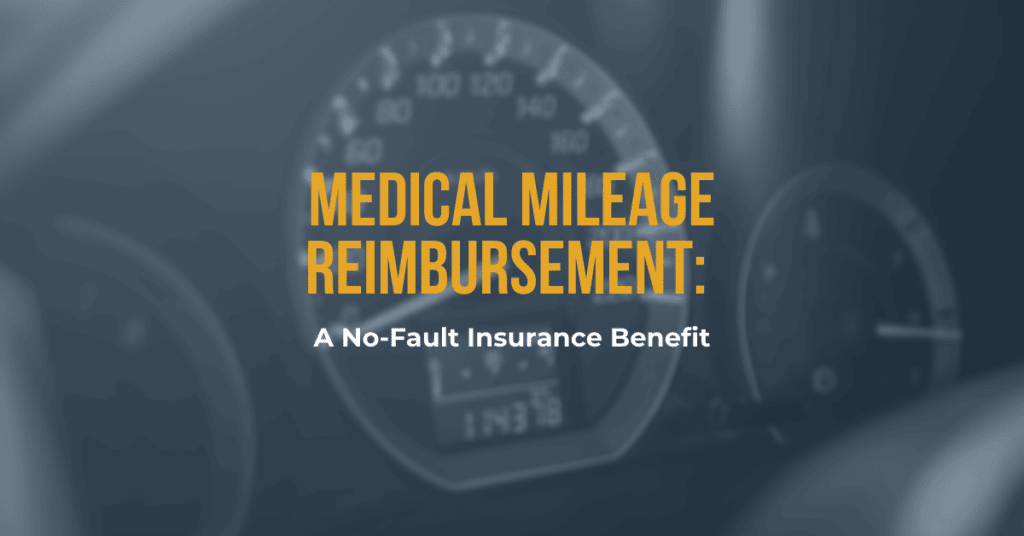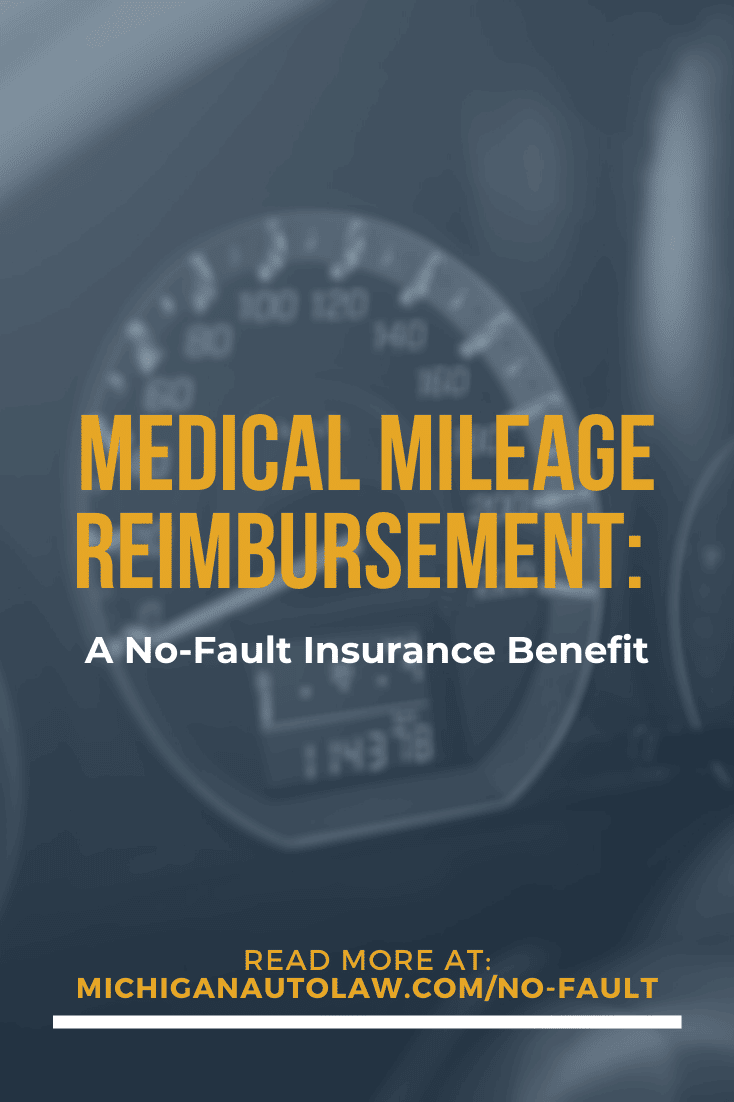
Medical Mileage Reimbursement: A No-Fault Insurance Benefit
The No-Fault medical mileage reimbursement is one of the PIP benefits that car accident victims are entitled to under Michigan’s No-Fault law. It pays for transportation costs for traveling to and from accident-related doctor appointments, hospitals and rehabilitation and therapy clinics.
What is medical mileage?
Medical mileage is a benefit provided to car accident victims through their No-Fault personal protection insurance coverage. It reimburses victims for the transportation costs and expenses they incur from having to travel to and from doctors appointments as they try to recover from their accident-related injuries.
What does this No-Fault reimbursement cover?
This No-Fault reimbursement coverage will pay for a car accident victim’s healthcare-related transportation costs, such as number of miles traveled, bus, taxi or Uber/Lyft fares in the event that the car accident victim does not drive, parking fees, gas, oil and tolls.
Michigan medical mileage rate for 2020
There is no fixed Michigan medical mileage rate for 2020. Car accident victims will often argue that the rate should be based on the IRS standard mileage rates which are $.57 per mile for 2020. After July 1, 2021, the rate may depend on the No-Fault law’s Medicare-based fee schedule.
How much coverage do I have for these travel expenses?
A car accident victim’s coverage for mileage for healthcare expenses is limited to the No-Fault PIP benefits coverage level in the auto insurance policy through which he or she is claiming benefits. Prior to July 2, 2020, all drivers in Michigan had unlimited No-Fault healthcare coverage.
Starting with car insurance policies issued or renewed after July 1, 2020, the No-Fault medical coverage available for car accident-related expenses for treatment under the policy will depend on which of the following coverage levels were chosen by the driver who purchased the policy:
- $50,000 of coverage for healthcare expenses (if the driver/named insured on the policy is enrolled in Medicaid)
- $250,000 of coverage for healthcare expenses
- $500,000 of coverage for healthcare expenses
- Unlimited coverage for healthcare expenses
- No coverage for healthcare expenses (if the driver/named insured on the policy has Medicare and elected to opt-out of this No-Fault coverage altogether)
The No-Fault law’s “priority” rules determine which auto insurance company pays for a car accident victim’s No-Fault medical mileage.
What it doesn’t cover all of my transportation costs?
If a car accident victim’s transportation costs associated with seeking accident-related healthcare exceeds the No-Fault PIP benefits coverage level in the policy through which he or she is claiming coverage, then the victim can sue the at-fault driver for “excess” benefits.
Alternatively, the victim may seek healthcare coverage through private health insurance, Medicaid or Medicare.
How do I claim my mileage?
To collect benefits for your healthcare mileage expenses after you were injured in a car accident, you must file a No-Fault application with the applicable auto insurance within ONE YEAR from the date of your car accident. (MCL 500.3145(1))
If you fail to file your No-Fault application (which is also called an “application for No-Fault benefits” or “notice of injury”) on time – within one year from the date of your car accident – then you will forever lose any benefits to which you might be entitled.
Car accident victims should keep a detailed record of their mileage and transportation expenses (including dates, total mileage traveled round-trip and the name of the doctor and treatment facility visited) and submit that information to their No-Fault insurance company along with their other accident-related treatment bills.
Who pays my No-Fault medical mileage?
If you have your own auto insurance policy in which you are the “named insured,” then your own auto insurer will pay your No-Fault medical mileage.
Otherwise the No-Fault law’s “priority” rules will determine what insurer is responsible. Generally – albeit subject to certain exceptions – if you don’t have a policy, then the applicable insurance company that will pay your reimbursement will be your spouse’s insurer or the insurer for a family member who lives with you.
If you don’t have coverage through any of these sources, then you will file your application for PIP benefits with the Michigan Assigned Claims Plan and they will assign an auto insurance company to pay for your benefits.
When is this reimbursement paid?
Your auto insurance company is supposed to pay your accident-related medical mileage within 30 days of receiving “reasonable proof” of what is owed. (MCL 500.3142(2)) If your auto insurance does not pay, then the unpaid expenses are deemed to be “overdue.”
Lawsuit for unpaid mileage
You can sue your auto insurance company for unpaid, overdue travel expenses for accident-related treatment, but your lawsuit must be filed within one year from the date that the number of miles traveled for treatment was incurred, otherwise you will lose your legal rights to sue to get recover the unpaid, overdue PIP benefits. (MCL 500.3145(2)) The one-year “period of limitations” is “tolled” from the date a claim is made “until the date the insurer formally denies the claim.” (MCL 500.3145(3))
Injured and need a lawyer? Call Michigan Auto Law
If you have been injured in a car accident and you have questions about your legal rights to Michigan PIP benefits, you can call toll free anytime 24/7 at (800) 968-1001 for a free consultation with one of our experienced auto accident attorneys. You can also get help from an experienced accident attorney by visiting our contact page or you can use the chat feature on our website.






